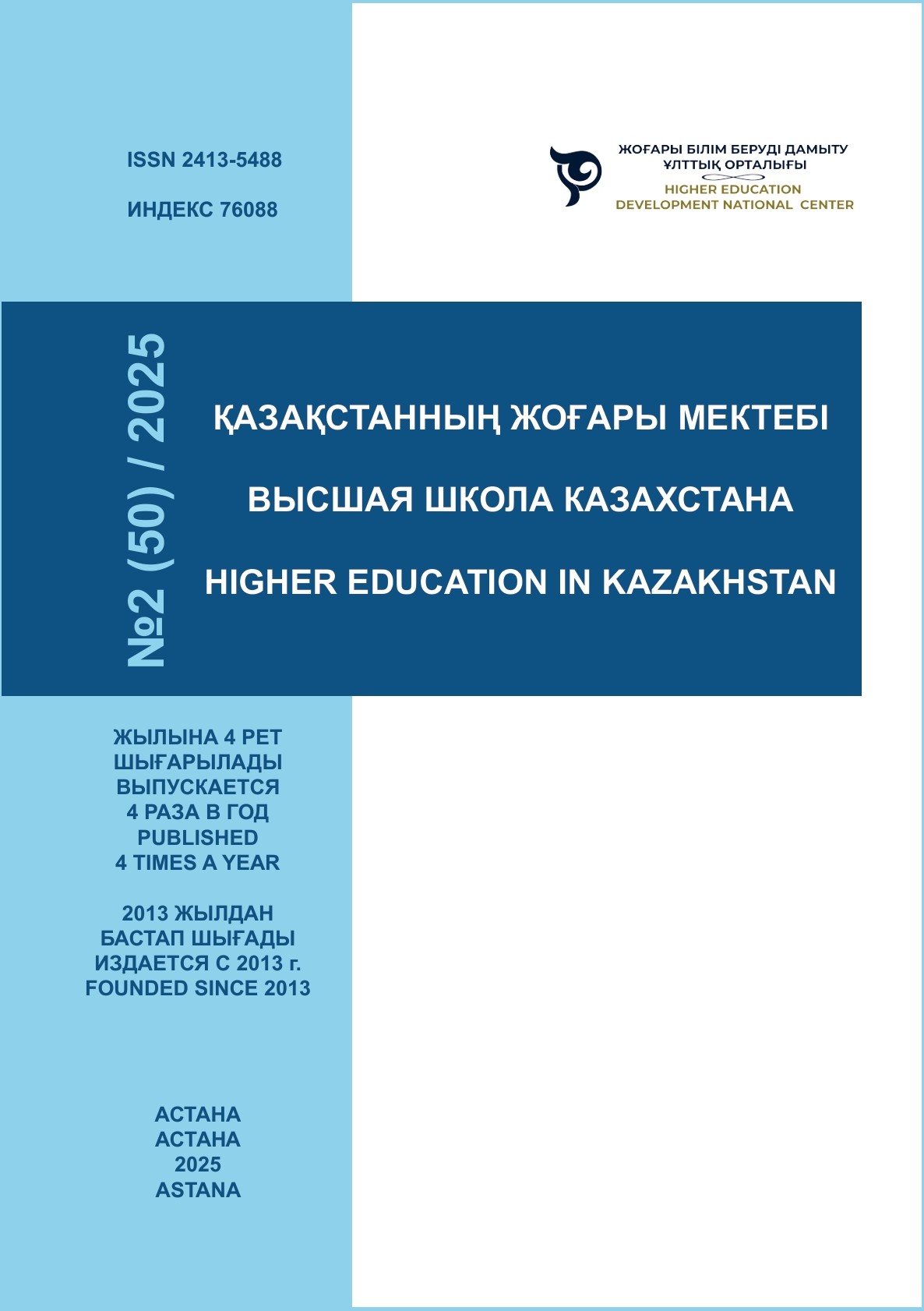TRENDS IN THE DEVELOPMENT OF KAZAKHSTAN'S HIGHER EDUCATION SYSTEM
DOI:
https://doi.org/10.59787/2413-5488-2025-50-2-80-93Аңдатпа
This work describes, systematizes and summarizes the problems of quality assurance, efficiency and effectiveness, in the context of the global competitiveness of the higher education system, which has been and remains one of the most acute problems of the development of modern society in the Republic of Kazakhstan. The persistence of challenges and gaps, despite the measures taken, is associated with the demographic growth of young people and the aging of teachers. Ensuring access to education, its quality, and the transformation of higher education to meet the needs of the labor market are becoming the primary goal for ensuring economic growth. The authors have identified the relationship and mutual influence of higher education trends with economic development trends, and provided recommendations for the development of the higher education ecosystem.
Әдебиеттер тізімі
Abad-Segura, E., & González-Zamar, M. D. (2021). Sustainable economic development in higher education institutions: A global analysis within the SDGs framework. Journal of Cleaner Production, 294, 126133. DOI: 10.1016/j.jclepro.2021.126133
Akour, M., & Alenezi, M. (2022). Higher education future in the era of digital transformation. Education Sciences, 12(11), 784. DOI.org/10.3390/educsci12110784
Burbules, N. C., Fan, G., & Repp, P. (2020). Five trends of education and technology in a sustainable future. Geography and sustainability, 1(2), 93-97. DOI.org/10.1016/j.geosus.2020.05.001
Crompton, H., & Burke, D. (2023). Artificial intelligence in higher education: the state of the field. International journal of educational technology in higher education, 20(1), 22. DOI: 0.1186/s41239-023-00392-8
De Wit, H., & Altbach, P. G. (2021). Internationalization in higher education: Global trends and recommendations for its future. Policy Reviews in Higher Education, 5(1), 28-46. DOI: 10.1080/23322969.2020.1820898
Government of the Republic of Kazakhstan. (2023, March 28). Concept of development of higher education and science in the Republic of Kazakhstan for 2023–2029 (Resolution No. 248). Retrieved from https://adilet.zan.kz/rus/docs/P2300000248
James Jacob, W. (2015). Interdisciplinary trends in higher education. Palgrave communications, 1(1), 1-5. DOI:10.1057/palcomms.2015.1
Kamińska, D., Zwoliński, G., Laska-Leśniewicz, A., Raposo, R., Vairinhos, M., Pereira, E., ... & Anbarjafari, G. (2023). Augmented reality: Current and new trends in education. Electronics, 12(16), 3531. DOI.org/10.3390/electronics12163531
Ministry of Science and Higher Education of the Republic of Kazakhstan. (2023, December 11). Ministry presents AI Sana: an innovative artificial intelligence program [Press release]. Retrieved from https://www.gov.kz/memleket/entities/sci/press/news/details/901457?lang=ru
Müller, C., & Mildenberger, T. (2021). Facilitating flexible learning by replacing classroom time with an online learning environment: A systematic review of blended learning in higher education. Educational research review, 34, 100394. DOI: 10.1016/j.edurev.2021.100394
Nancarrow, S. A., Booth, A., Ariss, S., Smith, T., Enderby, P., & Roots, A. (2013). Ten principles of good interdisciplinary team work. Human resources for Health, 11, 1-11. DOI:10.1186/1478-4491-11-19
Republic of Kazakhstan. (2023, October 27). On approval of the Rules for recognition of learning outcomes obtained through non-formal education, as well as results of recognition of professional qualifications (Order No. 544 of the Minister of Science and Higher Education and Order No. 322 of the Minister of Education and Science, dated October 24, 2023). Retrieved from https://adilet.zan.kz/rus/docs/V2300033580
Rosak-Szyrocka, J. (2024). The era of digitalization in education where do universities 4.0 go?. Management Systems in Production Engineering, 32(1). DOI 10.2478/mspe-2024-0006
United Nations Development Programme. (2024, March). Human Development Report 2023 24: Snapshot (Russian version) [PDF]. Human Development Report Office. Retrieved from https://hdr.undp.org/system/files/documents/global-report-document/hdr2023-24snapshotru.pdf

Жүктеулер
Жарияланды
Нұсқалар
- 2025-06-30 (2)
- 2025-06-20 (1)













